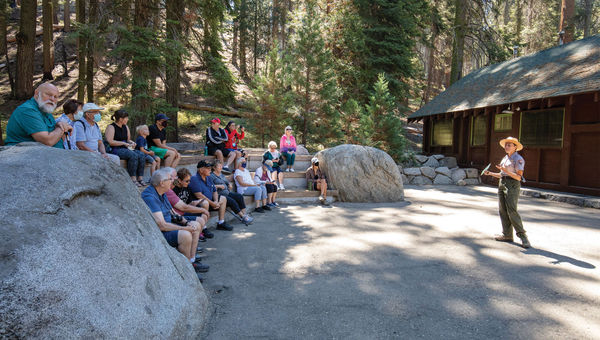Tour operators have expressed concern that the Trump administration's sudden dismissal of 1,000 National Park Service workers could impact operations during the peak summer season.
Several tour providers said they have been reassured by concession partners in the parks that services will not be interrupted, but some parks are already feeling squeezed by the layoffs.
The Trump administration laid off workers on Feb. 14 as part of its pledge to reduce government spending, sparking outcry from current and former park staff and park service supporters. According to the San Francisco Chronicle, a group of protesters hung an American flag upside-down from the top of El Capitan in Yosemite National Park in opposition to the cuts.
Since it first announced cuts in national parks jobs, the administration has reversed its decision to pause the hiring of seasonal workers. The Associated Press reported that the Trump administration would hire up to 7,700 seasonal workers and that at least 50 full-time jobs were being restored to help maintain and clean parks, educate visitors and collect admission fees.
While tour operators that offer national parks tours said they don't know how the federal downsizing will impact operations, they are approaching the busy summer season with some trepidation, especially as some parks and sites have canceled tours and shortened hours, just two weeks after the layoffs.
Scott Cundy, co-founder of U.S. adventure travel company Wildland Trekking, said he's worried about how a slimmer staff would adequately enforce regulations. Wildland offers 1,500 hiking and backpacking trips each year across 30 national parks and wilderness areas in the U.S., including Acadia, Death Valley and Mount Rainier.
"There can be delays on stuff that we need, like getting permits or renewing guiding licenses or different things that we really rely on the parks for," he said. "So if they're a lot more shorthanded, then there could be more delays."
Catherine Prather, president of the National Tour Association, said 80% of members operate national parks tours.
She said the owner of one receptive operator, who did not want to share his identity or company name, told her they had already canceled some itineraries due to "extremely low bookings" on tours that are normally sold out by this time of year, which the operator attributed in part to uncertainty caused by the the layoffs. The company could lose out on $1 million, Prather said.
Beyond the operators, she said gateway communities where the economy depends on tourism could be impacted by the domino effect of canceled park tours. Park visitors spent an estimated $26.4 billion in those communities in 2023, supporting 415,000 jobs and leading to $55.6 billion in economic output, according to the National Park Service.
"There are already reports of parks cutting back their hours or closing visitor centers , and that creates uncertainty for the traveler," she said. "They're just going to make decisions to either not travel to the national parks or to do something different. Cancellations of [park tours] mean lost revenue, not only for the parks but also for the tour and receptive operators, charter bus operators, the park concessionaires and many businesses surrounding the parks. This could have an unfortunate ripple effect."
Yosemite halted its camping reservation rollout, while Carlsbad Caverns National Park canceled guided tours and will pause 8:30 a.m. self-guided tours in March. Saguaro National Park and Effigy Mounds National Monument said they would close their visitor centers on certain days. Florissant Fossil Beds National Monument will close access to the site twice a week.

A group with Sunrise Tours attends a National Park Service ranger program in Sequoia National Park. Photo Credit: Caleb Lawson/Sunrise Tours
Sunrise Tours' guests have phoned the company to share concerns about upcoming trips, said vice president Caleb Lawson. The Missouri-based company includes national parks on about 75% of its itineraries. Nobody has canceled, he said, but they have asked about switching to non-park itineraries.
Lawson said the national parks were already understaffed and underfunded and that the additional cuts will "make it even harder for a company like ours to deliver on the things that we've sold and promised to our guests."
He expressed concern about longer entrance lines, closed visitor centers, cleanliness of facilities and whether there will be emergency personnel in the parks. "We're not jumping to any conclusions that things are all of a sudden going to be terrible, but at the same time we're trying to find out exactly what the impacts are going to be," Lawson said.
Sunrise has been in touch with its concession partners in the parks, who have tried to reassure them. Likewise, Tauck, which has offered national parks tours since its founding in 1925, has spoken with hoteliers in the parks, which president Jeremy Palmer said has eased some initial worries about impacts. After speaking with contacts in Yosemite, Zion, Yellowstone and Grand Canyon national parks, Palmer said he feels more optimistic.
Stephanie Brooks, vice president of product and operations for the Globus family of brands, echoed the sentiment, saying that conversations with supplier partners in lodging, restaurants and park concessionaires leads her to believe that those services will not be impacted. Still, she anticipates reductions in public service in the parks, like maintenance and staffing. The company is prepared to alter itineraries as needed, she said.
Worries aside, the full impact of the cuts remains to be seen.
"Our antennas are up," Palmer said. "Obviously, there's some disruption, and we have our eyes on it, but the headline is, we're not too worried at the moment."